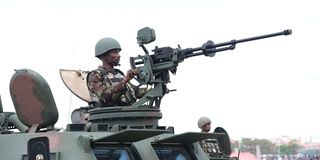Uhuru Kenyatta’s investments in security have paid off, but some gaps remain

A KDF officer in an armoured vehicle during Madaraka Day Celebrations at Uhuru Gardens in Nairobi on June 1, 2022.
President Uhuru Kenyatta was barely five months in office when four gunmen stormed the upscale Westgate Mall in Nairobi in September 2013, shooting at shoppers and diners indiscriminately.
By the time the gunfire subsided four days later, 68 people, including foreigners, had died in the full glare of local and international media. The siege which was a baptism of fire for the Jubilee administration, would form the basis for the security policies the state would take for the next decade.
It has been a mixed bag of successes and failures for President Kenyatta in the quest to keep Kenyans safe from organised crime, terrorism and corruption.
When you look at the security policies the Kenyatta administration has implemented, everything goes back to the Westgate attack, which forced the government to take a proactive approach.
Despite the involvement of the Kenya Defence Forces (KDF) and the General Service Unit’s (GSU) highly-trained Reconnaissance squad, it still took them more than 96 hours to neutralise four men in 35,000 square metres of space.
What followed was a mass transfer of security chiefs and resignations of some, plus the passage of security laws that handed total control of the appointment of heads of security agencies to the President. The security laws, which were opposed by the opposition and civil society were approved in Parliament amid televised chaos.
That was in September 2014, a year after the Westgate attack. In the months that followed, President Kenyatta began appointing military men and officers from the National Intelligence Service (NIS) to head crucial security and governance dockets.
The first casualties were David Kimaiyo, the Inspector-General of Police and Interior Cabinet Secretary Joseph Ole Lenku. In their places came Joseph Boinnet, a career intelligence officer, and the late Joseph Nkaissery a retired military man who was plucked from the opposition ODM party.
Also brought in was Noordin Haji from NIS to head the Directorate of Public Prosecution (DPP), Twalib Mbarak, a former military man turned spy to head the Ethics and Anti-Corruption Commission (EACC) and Alexander Muteshi, the head of counter terrorism at NIS, to head Immigration. To complete the equation, the President brought in James Githii Mburu, also from the NIS, to head the Kenya Revenue Authority (KRA).
Whether the President saw something in the disciplined forces that other Kenyans did not, he didn’t just hire them, he admired them. On several occasions, he wore military regalia in public functions, including on one national holiday, attended military drills and brought them out of the barracks to civilian duties like running Nairobi.
In his defence against accusations of turning Kenya into a police and military state, the President challenged civilian institutions to emulate the disciplined forces, especially KDF, for their efficiency in service delivery. He said that KDF had demonstrated a good work ethic and were saving taxpayers billions of shillings.
“Those complaining about KDF being awarded projects to an extent of seeking court interventions should understand that KDF are Kenyans who deserve equal opportunity. Needless to say, the same hand that carries a gun is the same hand that can handle a hoe,” said the president.
With appointments of key persons in crucial agencies complete the next piece of the puzzle was the establishment of a multi-agency task force that brought all the security agencies together in terms of intelligence sharing and response to national threats.
The task force, which the incoming President will find in place, includes officials from the DPP, Directorate of Criminal Investigations, NIS, Financial Reporting Centre, EACC, Asset Recovery Agency, Kenya Prisons, Office of the Attorney-General and KRA.
With this task force in place the Jubilee government deliberately also increased the financial allocation to security and defence.
Cumulatively, the Kenyatta administration has spent more than Sh1 trillion on the country’s internal security, defence and intelligence. Between 2014, the first full year of the Jubilee administration in power, and 2022, for example, the budget allocation for NIS has grown by 130 per cent from Sh20.1 billion to Sh46.1 billion in the current financial year.
These increases in funding were used to modernise the security forces and increase manpower. The number of police officers, for example, increased by 140 per cent from 42,145 when Jubilee took over to the current 101,421.
Other significant security expenses incurred by this administration on security and allied services include the roll out of Huduma Centres, introduction of digital passports, creation of the Integrated Communication Command and Control Centre, which monitors CCTV cameras installed on roads, the DCI forensic lab and the digital number plates.
The net effect of all these investments has been a reduction in terror incidents and some organised crimes like theft of motor vehicles. In fact, since 2019, Al-Shabaab has been unable to launch a large-scale attack on Kenyan soil.
“Our towns are safer and open to business for longer hours. Visitors can now travel to all parts of our country free of fear,” outgoing Interior CS Fred Matiang’i wrote to senior officers in the ministry in a farewell letter on Friday.
Yet despite these obvious gains in the security sector the outgoing administration has been accused of overseeing one of the worst eras of extra-judicial killings and enforced disappearances, picking up where the Kibaki administration left off.
The war on corruption has largely been a failure, with publicised arrests of senior government officials failing to translate to prison sentences. Furthermore, the state has been unable to find a lasting solution to cattle rustling and insecurity among pastoralist communities living in the Rift Valley.
As President-elect William Ruto takes over, his work is already laid out.





